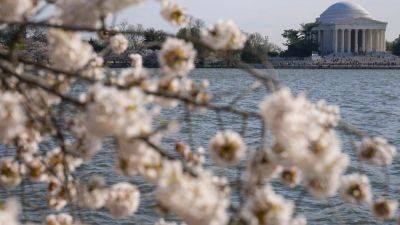More than 100 iconic cherry trees in Washington are being cut down. So long, Stumpy
WASHINGTON (AP) — The sun is setting on Stumpy, the gnarled old cherry tree that has become a social media phenom. This year’s cherry blossom festivities in Washington will be the last for Stumpy and more than 100 other cherry trees that will be cut down as part of a multiyear restoration of their Tidal Basin home.
Starting in early summer, crews will begin working to replace the crumbling seawall around the Tidal Basin, the area around the Jefferson Memorial with the highest concentration of cherry trees. The work has been long overdue, as the deterioration, combined with rising sea levels, has resulted in Potomac waters regularly surging over the barriers.
The twice-daily floods at high tide not only cover some of the pedestrian paths, they also regularly soak some of the cherry trees’ roots. The $133 million project to rebuild and reinforce the sea wall will take about three years, said Mike Litterst, National Park Service spokesman for the National Mall.
“It’s certainly going to benefit the visitor experience, and that’s very important to us,” Litterst said. “But most of all, it’s going to benefit the cherry trees, who right now are every day, twice a day, seeing their roots inundated with the brackish water of the Tidal Basin.” Litterst said entire stretches of trees to the water, as wide as 100 yards, or 90 meters, have been lost and can’t be replaced “until we fix the underlying cause of what killed them in the first place.”
<bsp-list-loadmore data-module="" class=«PageListStandardB» data-gtm-region=«READ MORE» data-gtm-topic=«No Value» data-show-loadmore=«true» data-gtm-modulestyle=«List B»> <bsp-custom-headline custom-headline=«div»> READ MORE </bsp-custom-headline> <bsp-custom-headline custom-headline=«div»>






